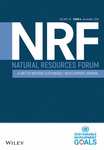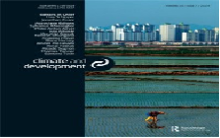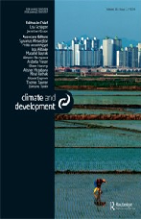Publications

|
A V Krishnan Exploring urban water-energy nexus: A case study of thermal power plants in Raichur and Ballari districts in Karnataka https://onlinelibrary.wiley.com/doi/10.1111/1477-8947.12507 Co-Authored with Sherin S Das, Rudrodip Majumdar and R. Srikanth, Natural Resources Forum - A United Nations Sustainable Development Journal |

|
R Srikanth Exploring urban water-energy nexus: A case study of thermal power plants in Raichur and Ballari districts in Karnataka https://onlinelibrary.wiley.com/doi/10.1111/1477-8947.12507 Co-Authored with Sherin S Das, Rudrodip Majumdar & A.V. Krishnan, Natural Resources Forum - A United Nations Sustainable Development Journal |

|
Rudrodip Majumdar Exploring urban water-energy nexus: A case study of thermal power plants in Raichur and Ballari districts in Karnataka https://onlinelibrary.wiley.com/doi/10.1111/1477-8947.12507 Co-Authored with Sherin S Das, A.V. Krishnan, and R. Srikanth, Natural Resources Forum - A United Nations Sustainable Development Journal The paper provides a coupled framework of the water-energy nexus for the water-stressed Indian cities, weaving together multiple interlinked facets, such as the demand for drinking water, water withdrawal patterns, water-related challenges in Thermal Power Stations (TPSs), and the benefits of using treated wastewater in TPSs. An integrated approach is suggested for maximizing the benefits of wastewater reclamation, while reducing the environmental impacts of inefficient water usage, specifically in TPSs, the largest water users in the industrial sector. This is particularly important for a developing country like India that faces declining water availability due to a growing population without commensurate increases in water-use efficiency. |

|
M Sai Baba International Day for Countering Hate Speech https://niascomm.in/2024/06/18/international-day-for-countering-hate-speech/ Scicom@NIAS Hate speech and its impact on society are not new. The scale and impact are increasing due to the emergence of new modes of communication and reaching out to people. The UN launched “The International Day for Countering Hate Speech,” which is observed on 18 June yearly. Hate crimes are rising and at an alarming pace. It is a double-edged sword. Newer communication technologies like social media enable activists to work for democracy and hate groups. |

|
Tejal Kanitkar Associate Professor, Energy, Environment and Climate Change Programme A new scenario framework for equitable and climate-compatible futures https://doi.org/10.1080/17565529.2024.2365939 Co-authored with Ranjan, A., & Jayaraman, T. (2024). A new scenario framework for equitable and climate-compatible futures. Climate and Development, 1–13. https://doi.org/10.1080/17565529.2024.2365939 |

|
Ankita Ranjan Doctoral Student, Energy, Environment and Climate Change Programme A new scenario framework for equitable and climate-compatible futures https://doi.org/10.1080/17565529.2024.2365939 Co-authored with Kanitkar, T., & Jayaraman, T. (2024). A new scenario framework for equitable and climate-compatible futures. Climate and Development, 1–13. https://doi.org/10.1080/17565529.2024.2365939 |

|
Vinay Kumar Dadhwal Assessing Landslide-Driven Deforestation and Its Ecological Impact in the Western Ghats: A Multi-Source Data Approach https://link.springer.com/article/10.1007/s12524-024-01896-0 Co-Authored With B. Swarada, S.V. Pasha, T. N. Manohara & H. S. Suresh. Journal of the Indian Society of Remote Sensing. 52, 1517–1531 (2024). |

|
Shaik Vazeed Pasha Assessing Landslide-Driven Deforestation and Its Ecological Impact in the Western Ghats: A Multi-Source Data Approach https://link.springer.com/article/10.1007/s12524-024-01896-0 Co-Authored With B. Swarada,T. N. Manohara, H. S. Suresh & V. K. Dadhwal. Journal of the Indian Society of Remote Sensing. 52, 1517–1531 (2024). The influence of landslides (LS) on forest structure, composition, and functionality has gained limited scientific attention compared to socioeconomic aspects. This study aims to fill this gap by investigating the dynamics of pre- and post-LS occurrences in and around the Kali Tiger Reserve (KTR), Western Ghats. Our approach integrates multi-source, multi-temporal earth observation data, vegetation indices, field observations, and machine learning techniques. This study identified 245-LS caused due to a catastrophic rainfall event in July 2021 the most severe over a century that impacted the tropical dense forests. The present study highlights the emergence of invasive alien species (IAS), particularly Chromolaena odorata, following these landslide incidents. Field observations revealed a significant loss of large trees, which corroborated with the Global Ecosystem Dynamics Investigation (GEDI) based Canopy Height Model (CHM) and very high-resolution (VHR) data. The affected areas witnessed a significant rise in land surface temperature (LST) and a decrease in vegetation moisture. A comparative analysis with operational tree loss monitoring using optical (30-m Landsat based Global Forest Watch (GFW), and microwave (L-band Synthetic Aperture Radar (SAR) JICA-JAXA (ALOS-2) Forest Early Warning System) revealed improved performance in mapping small landslides with current approach. These results emphasize the necessity of conducting local and large scale investigations of forest dynamics before and after landslides to meet environmental commitments at various levels. The landslide events will likely induce significant alterations in the forest's microclimate. Our research recommends an immediate action plan to restore affected sites, remove IAS, and encourage the planting of native vegetation for biodiversity conservation. |
